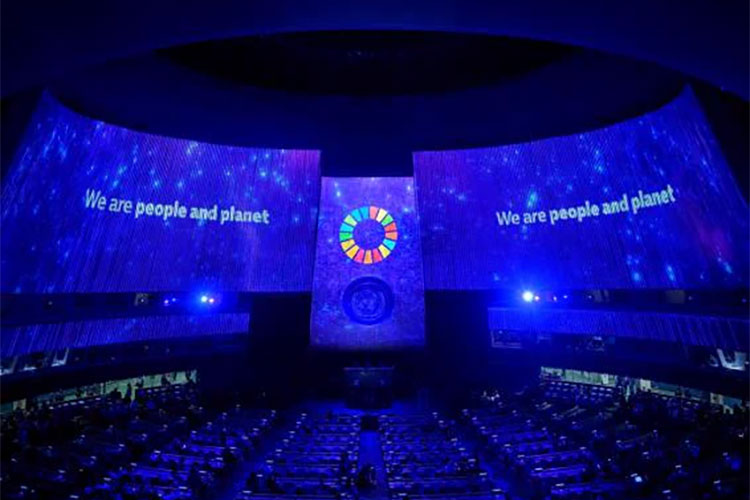The International Trade Union Confederation (ITUC) welcomes references to workers’ calls for a New Social Contract in the SDG Summit Political Declaration and urges that it is now time to move from words to action. Trade unions stand ready to engage on achieving the Sustainable Development Goals (SDGs) for people and the planet.
This year’s SDG Summit marked the halfway point towards the 2030 Agenda and the accomplishment of its 17 SDGs. According to the UN Secretary General’s last SDG Progress Report, a mere 12 per cent of the SDG targets with data are on track. A similar lack of urgency holds true for the world of work, where multiple crises have exacerbated a decades-long trend in the erosion of workers’ rights, as well as a century-long decrease in the labour share of GDP, with women continuing to pay the higher price.
Trade unions welcome the fact that the SDG Summit Declaration contains several elements of workers’ calls for a New Social Contract centred on SDG 8 (related to decent work and economic growth), such as:
- A renewed commitment to decent work for all, social protection and equal pay for work of equal value, including the mobilisation of resources to provide adequate means for developing countries to create decent jobs.
- A clear support for the implementation of the UN Global Accelerator on Jobs and Social Protection for Just Transitions.
- Concrete commitments to face the climate emergency, such as a call for the operationalisation by COP28 of the Loss and Damage Fund adopted at COP27, and for a legally binding instrument on plastic pollution by 2024.
- A call for the “responsible use of science, technology, and innovation as drivers of sustainable development”, including by “addressing the challenges of artificial intelligence” and “eliminating all forms of discrimination and violence against women and girls in digital contexts”. In the trade union view that means that policies and regulations that govern technology, data and the deployment of algorithms must be in line with International Labour Standards to ensure privacy and people’s control over and ownership of their own data.
The ITUC also views the inclusion of financial measures to implement the above policies and priorities in the Declaration as a further positive development. These include:
- A call for reforming international financial architecture to make it more “equitable and responsive to the financing needs of developing countries” and to broaden and strengthen these countries’ “participation in international economic decision-making, norm-setting and global economic governance”.
- A commitment to improve international debt mechanisms “with an expansion of support and eligibility to vulnerable countries in need”, and to strengthen international tax cooperation.
- A call on multilateral development banks and the multilateral trading system to provide additional financing to the SDGs in support of developing countries.
Despite the positive additions to the Declaration, trade unions are disappointed by the absence of references to social dialogue and international labour standards in the Declaration, which are both key governance tools for the SDGs.
More generally, the tense negotiation process of the Declaration, as well as the lack of unanimity on the final text, signals the need to restore a “sense of confidence in the fact that UN-led multilateralism delivers”, as highlighted by the President of the General Assembly during the opening ceremony of the SDG Summit.
National governments urgently need to fast-track their commitments and work together with social partners to build transparent, inclusive and gender-transformative multilateral frameworks under UN leadership. Within such frameworks, trade unions are determined to keep the call for a New Social Contract a high priority in all discussions related to the acceleration of the 2030 Agenda.


